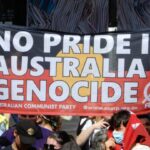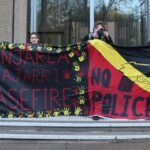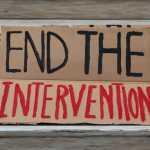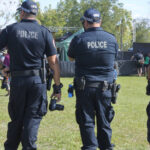Damning Evidence Concerning Killer Cop Mounts During Custody Death Inquest
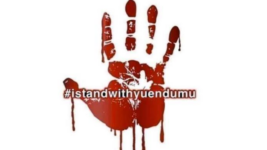
Northern Territory police constable Zachary Rolfe left the territory’s Supreme Court a free man last March, after an all-non-Indigenous jury found him not guilty of murder, manslaughter and even the lesser crime of committing a violent act causing death, after he shot and killed Warlpiri teenager Kumanjayi Walker on 9 November 2019.
Rolfe’s trial was significant, as it could have resulted in the first time an Australian police officer was convicted of the murder of a First Nations person in custody.
Indeed, taken on its own, the evidence against Rolfe was damning. But, in Australia, history has proven that white cops don’t get convicted over Indigenous deaths.
Walker’s family and the broader community of Yuendumu, the remote NT town where Kumanjayi lived, were devastated by the outcome. And they turned to the now underway coronial inquest into the death of the 19-year-old Walpiri man, as holding potential for broader reforms in this area.
The acquittal of Rolfe led the Warlpiri elders of Yuendumu to launch the Karrinjarla Muwajarri-Ceasefire campaign, which is calling for an end to police patrolling unarmed remote Aboriginal communities with military-style weapons.
But it seems getting away with murder isn’t enough. Just days before the three-month coronial inquiry into Walker’s death commenced on 5 September, Rolfe’s legal team began objecting to the admissibility of certain evidence, even though it had months to formally make the objections.
Matters of contention
The territory’s Coroner Elisabeth Armitage is set to hear from 80-odd witnesses during the inquiry, which will investigate seven matters, including the circumstances of Walker’s death, the decision to deploy the NT Police Immediate Response Team (IRT) to deal with the teenager and the broader policing issues.
But, four days prior to the inquest, Rolfe’s barrister David Edwardson KC submitted objections to “four different categories” of evidence to be tendered during the inquest, as, the lawyer asserted in court on 9 September, that they have the potential to “undermine the jury verdict of acquittal”.
This evidence includes Rolfe’s “accuracy and honesty” in applying to the Northern Territory Police Force, text messages reflecting systemic racism and whether the constable was affected by illicit substances at the time of the shooting.
Edwardson also called for another matter to be withheld, which arose after his initial objections. This involved the NT police executive considering whether to refer another matter – “the Ryder incident” – to the NT Director of Public Prosecutions for a second time just two days prior to the inquest.
The Ryder incident concerns 2019 proceedings against Indigenous man Malcolm Ryder, in which NT Local Court Judge John Birch found that Rolfe had likely “lied” under oath, and despite his saying otherwise, he’d probably “deliberately banged” the accused’s head on the ground.
Edwardson claimed that the raising of possible court action against Rolfe over his potential lying about the incident two days prior to the inquest was “not coincidental”.
However, the lawyer representing NT police, Ian Freckelton KC, later told the inquiry that “constable Rolfe will not be charged with perjury in respect of this issue”.
A lawless approach
Counsel Assisting the Coroner Dr Peggy Dwyer criticised Rolfe’s legal team for hampering proceedings with last minute objections, which this week, led to two days’ worth of arguments regarding whether text messages should be admitted as evidence.
And as texts did go on to be tendered, Dwyer ran a series of them by Sergeant Anne Jolley on Wednesday to gauge her reaction. With sixteen years’ experience on the NT Police Force, Jolley used to be stationed in the town of Yuendumu.
The first text from 28 February 2019 has Rolfe describing Alice Springs, as “the wild west” with his position on the IRT involving “fuck all rules”.
In a 10 March text, he explained he was out at Borroloola to curb rioting, but as the police “smashed” the people the last time they’d been called out there, the locals were now “behaving”.
Another text saw Rolfe explain that you’re “definitely allowed to towel locals”, which means beat them up. And in numerous other messages, he refers to First Nations people as “grubby fucks”, “coons”, “Neanderthals who drink too much alcohol” and “niggas”.
Needless to say, Jolley wasn’t too impressed by the racist descriptions made by her colleague. She described them as “disgusting and disgraceful”. And in terms of his appraisal of what was expected on the job, the sergeant said it was “concerning” and insisted that police “live by the rules”.
The killer cop who walked
During NT Supreme Court hearings regarding the admissibility of evidence in July last year, the shooting incident that led to Kumanjayi’s death, following Rolfe and NT constable Adam Eberl having entered his grandmother’s home at around 7.20 pm that evening, were described.
After a scuffle ensued between the two officers and the Warlpiri teenager, Walker pulled out a small pair of medical scissors and stabbed them into the left shoulder of Rolfe, who responded by shooting the young man in the back.
Eberl then wrestled the Warlpiri teen to the ground. Walker’s right hand holding the scissors was underneath his body, and therefore, posed no further threat. And the constable was on top of the young man, with his right arm around his neck and his left leg pinning him down.
At this point, Rolfe placed his arm on his partner’s back. The killer cop then fired two shots into the left side of Kumanjayi’s chest at “point blank range”. He then remarked to Eberl, “It’s all good. He’s got scissors in his hand. He was stabbing me. He was stabbing you”.
Prior to being employed by NT police, as he continues to be to this day, Rolfe was an ADF army officer, who served in Afghanistan, where he was mentored by former officer Ben Roberts-Smith, who’s only recently taken three media outlets to court over reporting on his alleged war crimes.
Warlpiri elders from Yuendumu launched their Karrinjarla Muwajarri: Ceasefire campaign calling for police guns out of remote communities in March, and they underscore that they’re especially opposed to ex-army officers patrolling their streets with guns.
As campaign leader Warlpiri Elder Ned Jampijinpa Hargraves told Sydney Criminal Lawyers in June, “When we heard this news, it brought fear to our community. It’s a threat to our community. When Zachary Rolfe was acquitted, it was a threat.”
“Will it happen to us, what happened to that young fellow? It has brought lots of fear. And also, it is a threat to the community.”


